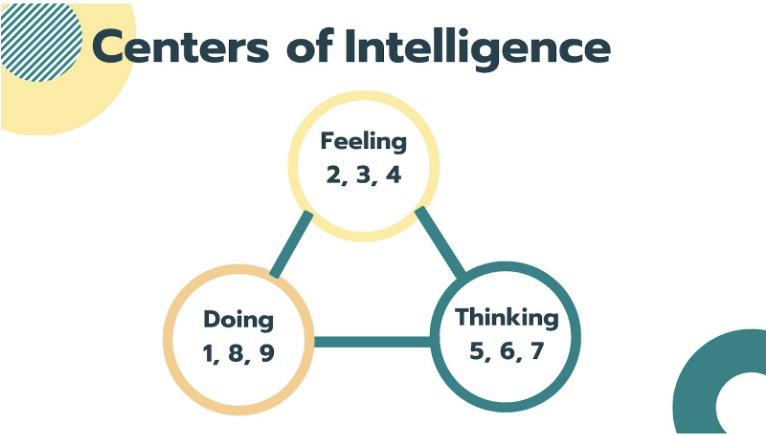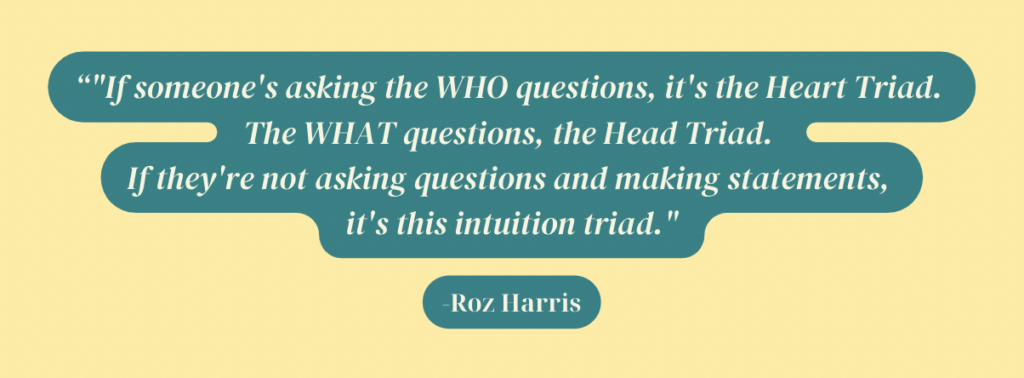HOW TO GET ALONG WITH ANYONE using the Enneagram and Centers of Intelligence. Part 1
Part 1
back to the blog
written by
Determining and understanding someone’s dominant center of intelligence can be a powerful tool for deepening relationships and fostering better communication. The Enneagram, a model that divides human personality into nine interconnected types, is grouped into three primary centers of intelligence: the Heart, Head, and Body/Gut. Each center perceives, processes, and reacts to the world differently, offering unique insights into how people interact with their environment.
The Three Centers of Intelligence

When we talk about relationships, it’s easy to think of the ones that are closest to us—our family, our partners, our dearest friends. However, our everyday relationships with coworkers, neighbors, and even the people we see regularly at the gym or grocery store are just as important. These interactions might seem fleeting, but they play a significant role in our daily experiences.
- Thinking Center (Types 5, 6, 7): Those in the Thinking triad are driven by the need for security, clarity, and certainty. Their core struggle often revolves around fear and anxiety, leading them to overanalyze and think ahead to feel secure. They are logical, future-oriented, and often seek to solve problems to feel at ease.
- Feeling Center (Types 2, 3, 4): People in the Feeling triad are guided by emotions and the need for connection and significance. Their main struggle is with shame or a perceived lack of self-worth, making them highly sensitive to how they are seen and valued by others. They are empathetic, relationship-focused, and often seek validation to feel loved.
- Doing Center (Types 8, 9, 1): The Doing triad is driven by action, control, and the need for autonomy. Their core struggle is with anger, manifesting as a desire to control their environment or a need for peace. They are action-oriented, practical, and often seek to implement plans or ideas to feel in control.
Clues to Identify the Dominant Center of Intelligence
In everyday interactions, you may not always know someone’s Enneagram type, but there are subtle clues that can help you determine their dominant center of intelligence. Recognizing these clues allows you to respond in ways that align with their natural tendencies, fostering a deeper connection and understanding.
1. Questions They Ask (or Don’t Ask)

- Heart Center: People in the Heart Center often ask “who” questions. They are concerned with relationships and the emotional dynamics between people. They might ask, “Who is involved?” or “Who will be affected?”
- Head Center: The Head Center is driven by curiosity and the need for security, leading to “what” questions. They are likely to ask, “What do we need to do?” or “What could go wrong?”
- Gut Center: Individuals in the Gut Center may not ask many questions at all. Instead, they make definitive statements based on their intuition or gut feelings. This group operates from a place of knowing rather than inquiry.

2. Gestures and Body Language

- Heart Center: People in this center often touch their chest when expressing emotions. This gesture indicates their connection to feelings and the emotional landscape they navigate.
- Gut Center: Those in the Gut Center might touch their belly or have hands on hips, signaling their reliance on instinct and intuition. They often express their thoughts as bodily sensations rather than abstract ideas.
- Head Center: This group is less likely to use significant gestures like touching their head. Their processing is internal, and their body language might be more reserved compared to the other centers.
3. Communication Style and Reaction

- Heart Center: Emotional expression is key. They often talk about how things feel and are sensitive to the emotional atmosphere. If you notice someone frequently seeking emotional reassurance or validation, they may be leading from the Heart Center.
- Head Center: Look for logical reasoning and the need to explain or understand. Their conversations often revolve around planning, analyzing, and seeking security through knowledge.
- Gut Center: Direct and decisive, those in the Gut Center may come across as assertive or strong-willed. Their reactions are often immediate and based on a deep-seated sense of what is right or necessary.
“People show us in subtle ways. But we have to be aware and paying attention.” – Jennifer

Jennifer Stanley
share it
12
Sep
more posts
Copyright Living Well 2023-2025. All Rights Reserved. Privacy Policy. Terms of Service. Site Credit.
Courses
Need direction?
Discover what you need to chart a path to a more meaningful tomorrow.
are you ready for more?
AROUND THE SITE
follow @livingwellbyjen
Discover Your Number
Paragraph






